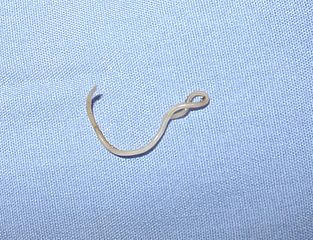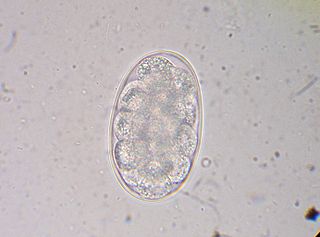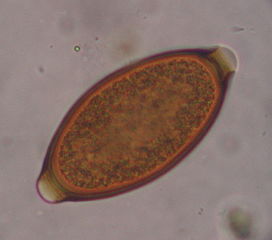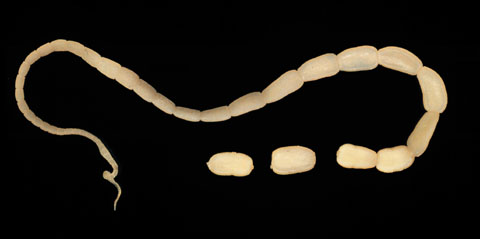Common Dog Worms
By Janice Jones |Last Updated 07-06-2021
Discussing those common dog worms that live in the intestines and hearts of dogs does not make for polite dinner conversation. However, if left unchecked, these little creatures can make your dog and even you very ill and could be potentially deadly.
The most common types of intestinal worms include roundworms, hookworms, whipworms, and tapeworms.
Dogs can also acquire Coccidia and Giardia, which are single celled organisms.
Click here to learn more about Coccidia.
In addition to those dog worms that live in the intestinal tract is the heartworm.
Roundworms
 Round Worm
Round WormThe most common form of intestinal parasite is the roundworm. Animals with roundworms pass the infection to others when they shed the worm’s eggs in their stool.
Other animals will eat the infected feces, walk on it and lick their paw, or drink contaminated water.
Mothers can pass the infections onto their puppies either before birth or during nursing. Infected animals can have serious health problems including malnutrition and intestinal issues including diarrhea.
Infected animals pose a risk to people because the eggs can be accidentally eaten or enter through the skin. Children are at greatest risk especially if they play in areas with infected feces.
If untreated in people, the larval forms can eventually enter organs and other tissues resulting in damage.
Hookworms
 Hookworm egg as seen under a microscope
Hookworm egg as seen under a microscopeHookworms are also common in dogs and can be especially dangerous because they bite into the intestinal lining of the dog and suck blood.
If untreated, hookworm infestations can result in potentially life threatening blood loss, weakness, and malnutrition. Sadly, humans can also be affected when larvae penetrate the skin.
If hookworm larvae penetrate the skin they can cause "cutaneous larval migrans", a potentially serious and scarring inflammation results.
The larvae produce severe itching and tunnel-like red areas as they pass through the skin. Symptoms that the dog may show include bloody diarrhea, weight loss, anemia, and progressive weakness.
Whipworms
 Whipworm egg as seen under a microscope
Whipworm egg as seen under a microscopeWhipworms pass their eggs in the feces and other animals become infected by eating infected soil or licking areas of their bodies that have come into contact with the whipworm eggs. They are very resistant and can live in the environment for 5 to 7 years.
Whipworms are similar to hookworms in so far as they bury their heads into the lining of the dog’s intestine and such blood, but are not as harmful as the hookworm.
The Whipworm lives in the first section of the dog’s large intestine called the cecum and are often more difficult to detect because they shed few eggs. Some of the symptoms that a dog with whipworms may display include chronic weight loss, and feces that seems to have a lightring of mucus.
Whipworms rarely infect humans. Whipworm infection is detected by viewing the eggs under a microscope. It sometimes takes several samples for eggs to be seen as they do not shed many eggs at one time.
Tapeworms
 Tapeworm is seen by the naked eye.
Tapeworm is seen by the naked eye.Tapeworms are the only worm you can actually detect without the aid of a microscope. They are thin flat-segmented worms that are passed from animal to animal when the dog eats infected fleas or lice.
They can also get certain types of tapeworms by eating infected rodents. The dog will pass segments of the worm that can be detected under the tail or in the stool. They look like flattened grains of white rice.
These visible portions are only a segment of the actual worm and contain the eggs. They will be moving if they are still alive. If they are dead, they appear as yellowish-gold rice segments.
Do not mistake the tapeworm for maggots. Maggots are rounded and are not seen in freshly passed stool.The full worm is much longer. People do not generally get dog tapeworms.
Risk
Factors for Common Dog Worms
Four scenarios put dogs at risk for worms:
- Newborn Puppies: Roundworm eggs can
form cysts in adult dogs and that remain dormant. When a female dog
is pregnant, these dormant eggs will activate and infect the
puppies. The mother's milk can also pass roundworms to puppies.
- Contact with infected dirt - Roundworm eggs and
hookworm larvae can reside in dirt. If you dog runs into infected
dirt while on a walk, at a dog park, or out in the wild, your dog may get
worms.
- Fleas - Young tapeworms can reside in fleas. If
your dog swallows fleas while licking a paw or other part of his body, he
could ingest tapeworms and be infected.
- Hunting or eating wildlife - wild animals may carry worms, including tapeworms residing in fleas on wild animals. If your dog hunts or eats wildlife, your dog may swallow worms.
Diagnosis
of Common Dog Worms
A veterinarian can perform a simple fecal test and prescribe a de-wormer. You will need to take a fresh fecal sample to your veterinarian to have the test performed.
At the vet's office, a technician will mix the sample with a special medium and then prepare a slide. Worm eggs can be detected under low power magnification.
Treatment
for Common Dog Worms
There are a few medications on the market today that will take care of the parasites in inhabit your dog.
To treat the coccidia organisms, veterinarians will use drugs such as sulfadimethoxine (Albon®) and trimethoprim-sulfadiazine (Tribrissen®)
Heartgard Plus**Tri-Heart Plus**Iverhart Plus** is used to treat Heartworms, but it also takes care of as well as preventing Heartworm. Their main ingredients are ivermectin and pyrantel pamoate.
Drugs such as Nemex-2** contain
pyrantel pamoate and treat roundworms and hookworms. Drugs such as
Panacur** and Safegard** are used to treat roundworms, hookworms, whipworms and
tapeworms. If given for a longer period of time, they will also treat coccidia.
Prevention
of Common Dog Worms
- Keeping fleas away from the dog will also prevent
tapeworm infections.
- Do not let your dog roam and hunt; raw meat, carrion,
or parts of dead animals that are likely carriers of parasites.
- Keep your grass mowed and pick up feces frequently.
- Keep up to date with monthly heartworm medication
To protect yourself and your family the best preventative is good hygiene, which means:
- Wash hands frequently
- Keep sandboxes covered
- Wear shoes when outdoors.
The images used on this page are courtesy of Creative Commons
"Hi, I'm Janice Jones, a former veterinary technician and Shih Tzu expert with over 40 years of experience with the breed. Through Miracle Shih Tzu, I combine my medical background and extensive breed knowledge to provide reliable, practical advice for Shih Tzu owners. My mission is to help you give your Shih Tzu the happiest, healthiest life possible through evidence-based information and real-world solutions. Whether you're new to the breed or a seasoned owner, you'll find trusted guidance here for all aspects of Shih Tzu care.
I hold an undergraduate degree in Psychology with a minor in biology, Early Childhood Education, and Nursing, and a Master's in Mental Health Counseling.



